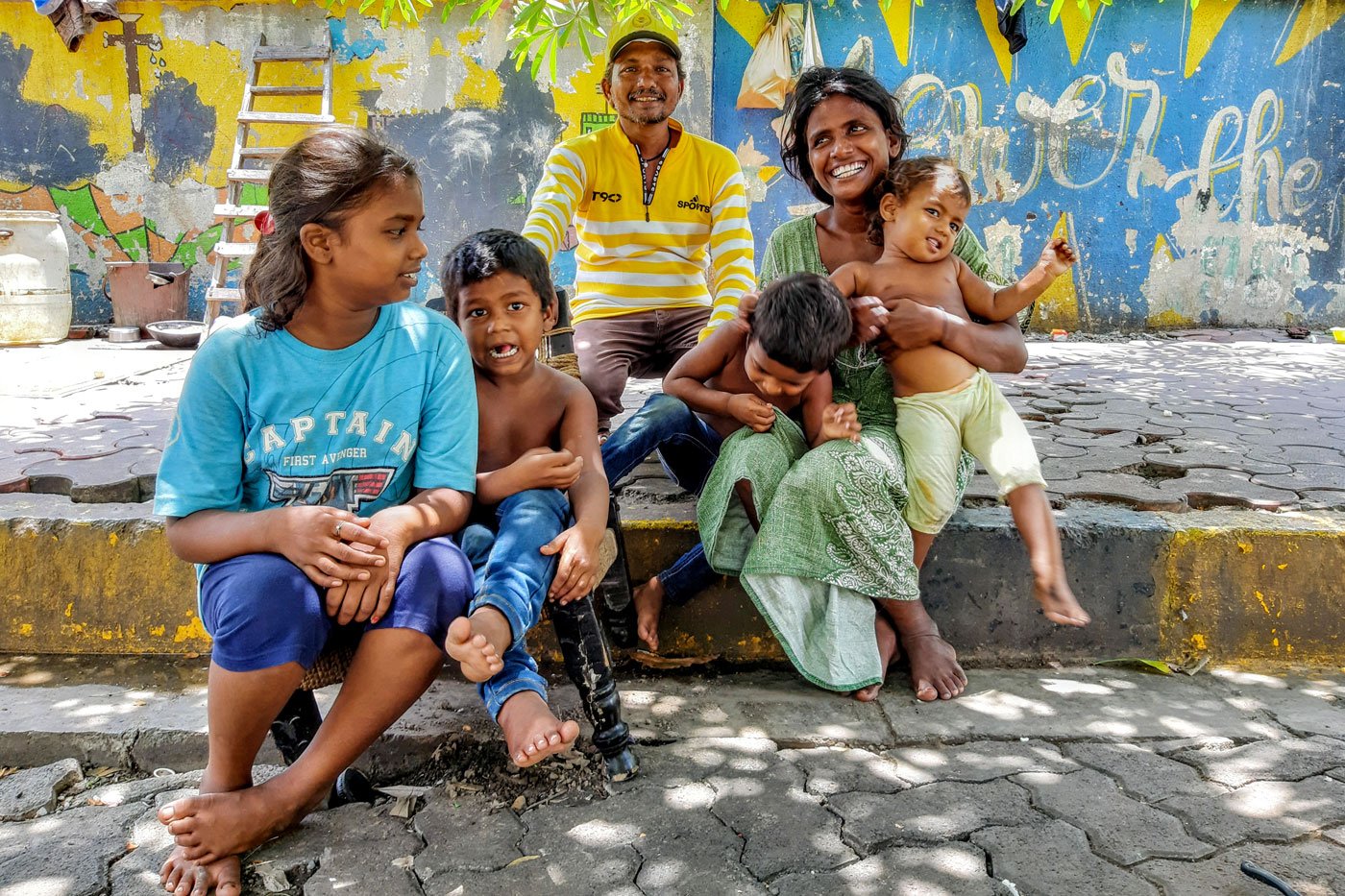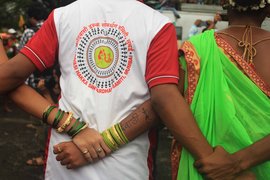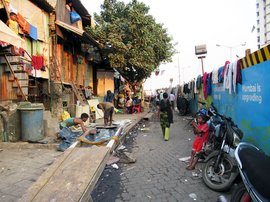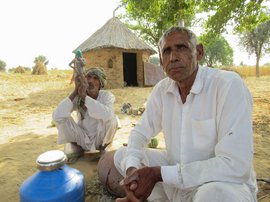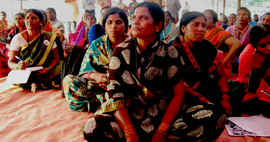Meena did not sleep that night. The rain water had entered her home. The flimsy tarpaulin couldn’t hold the downpour and crashed in minutes. Meena and her family ran to take shelter in front of a closed shop.
“We sat there the whole night [in early July] until the rain stopped,” she says, resting on a white printed sheet by the side of the main road one afternoon, her two-year-old daughter Shama sleeping next to her.
After that downpour, Meena had come back and put up their dwelling once again. By then many of their belongings – utensils, grains, school books – had floated away.
“The masks we had floated away too,” says Meena, green cloth masks given by volunteers during the early lockdown phase. “How does it matter if we wear a mask?” she adds. “We are already like dead humans, so who cares what corona does to us?”
Meena (who uses only her first name) and her family – husband and four children – are used to seeing their sparse belongings floating away. It’s happened more than once since the beginning of this monsoon and repeats every year – heavy downpours batter their hut on a pavement in the Kandivali East suburb of north Mumbai.
But until last year, when it rained heavily, the family could run to nearby construction sites to take shelter. This has now stopped. Meena, who is around 30, says, “We are used to this rain, but this time, corona has made it difficult for us. We would go to those buildings and wait. The watchmen knew us. Even the shopkeepers let us sit just outside their shops in the afternoons. But now they do not let us even walk nearby.”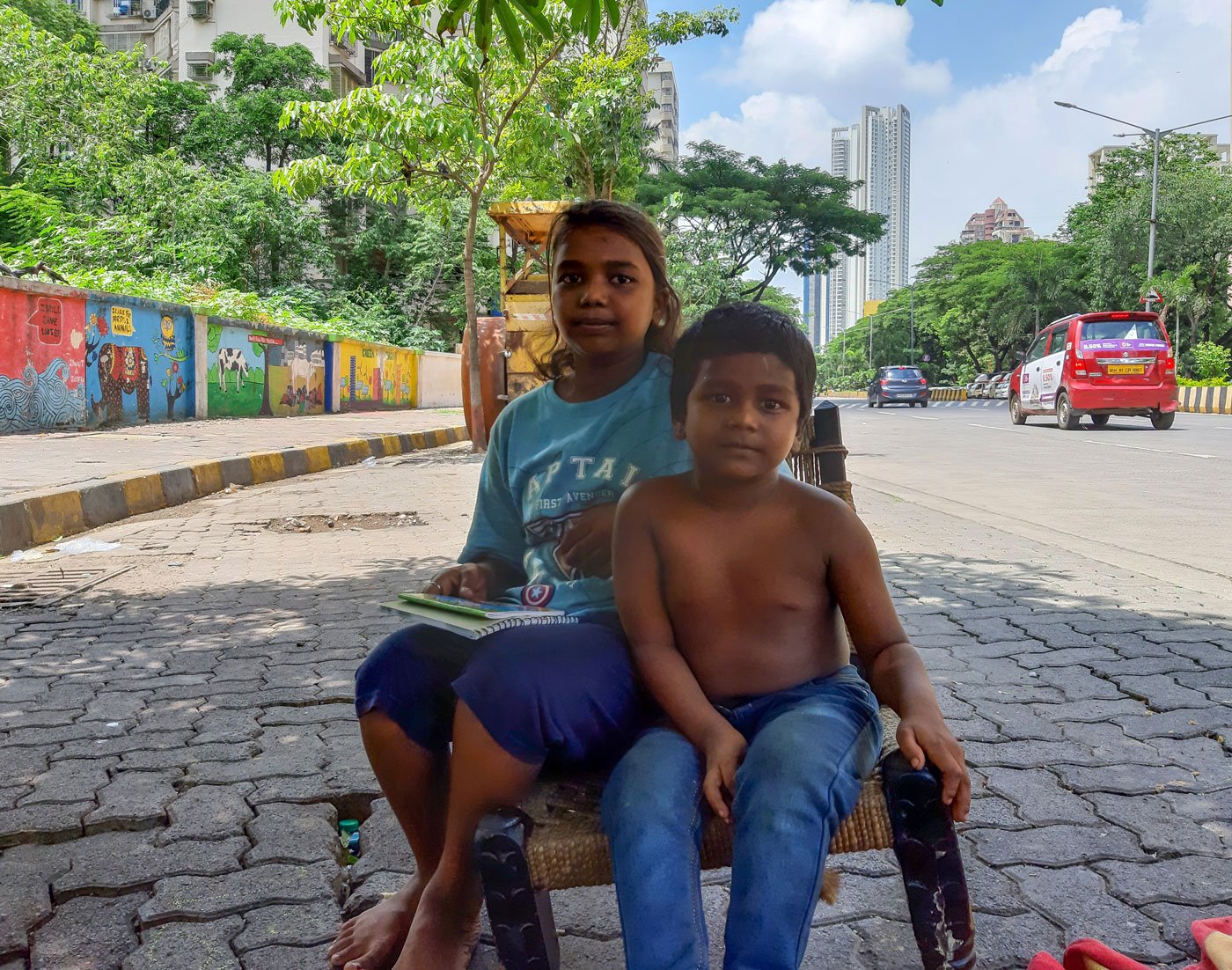
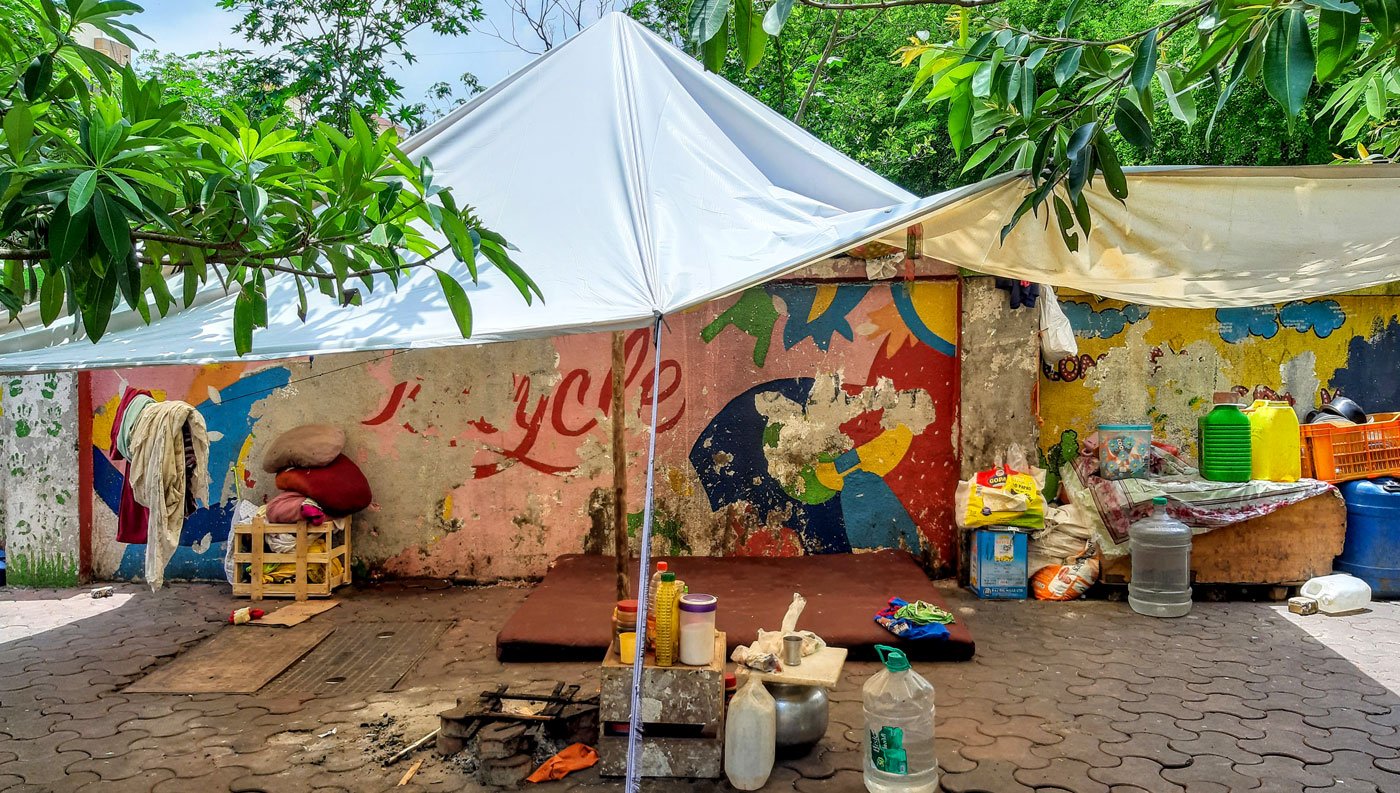
During the lockdown, Meena and her family – including her daughter Sangeeta and son Ashant – remained on the pavement, despite heavy rains
So they mostly sit through the rain at ‘home’ – a loose white tarpaulin sheet stretched between two trees and a wall, with a thick wooden bamboo stick at the centre holding up the canopy. A few plastic sacks and cloth bundles and a black canvas schoolbag hang from the trees – holding clothes, toys and other belongings. Drenched clothes hang nearby on a rope and a faded maroon mattress lies soaked on the ground.
Meena’s partner Siddharth Narvade is from Sarwadi village in Jalna district of Maharashtra. “I was very young when my father sold off his small piece of land and shifted to Mumbai for work,” says 48-year-old Siddharth, “And later I moved in with Meena.”
He used to work at construction sites, earning Rs. 200 a day for plastering cement. “That stopped when the lockdown began,” he says. The contractor hasn’t called him since or taken his calls.
Meena was employed as a domestic worker in a nearby building, until her employer moved house in January this year. Since then, she has been looking for work. “People here know that I live on the street. Nobody will give me work because now they are scared to even let me in [due to Covid-19],” she says.
When the lockdown began in the last week of March, people from nearby buildings regularly came by to give the family some food. That was their main source of sustenance. They didn’t receive rations from the state or any safety kit, Meena says. By the end of May-early June, these food packets became less frequent, though the family still receives them – either rice, wheat and oil, or cooked meals.!['I cannot store milk, onions potatoes… anything [at my house],' says Meena, because rats always get to the food](/media/images/03a-20200630_105735.max-1400x1120.jpg)
!['I cannot store milk, onions potatoes… anything [at my house],' says Meena, because rats always get to the food](/media/images/03b-20200630_110024.max-1400x1120.jpg)
'I cannot store milk, onions potatoes… anything [at my house],' says Meena, because rats always get to the food
“The rats also eat with us,” says Meena. “In the morning we see the grains lying all over the place. They tear up whatever is lying around. This has always been a problem, even if I hide food under a container or wrap it in cloth… I cannot store milk, onions potatoes… anything.”
Since the beginning of August, Meena and Siddharth have started collecting discarded glass bottles of beer or wine, as well as plastic bottles, from the streets of Kandivali. They take turns to do this at night, so that one of them stays back with the kids. They sell these items to a nearby scrap dealer for Rs. 12 a kilo for bottles, and Rs. 8 a kilo for paper and other scrap material. Two or three times a week, they manage to earn Rs. 150.
The family used to collect drinking water from a BMC tanker that came to water plants and trees – it stopped for some weeks after the lockdown began, and during the monsoon does not make its rounds. At times, they collect water from a temple nearby, or from a tap in a school some distance away, and store it in 20-litre jars and plastic containers.
Meena and Sangeeta bathe at night, in the pracarious privacy of some bushes beyond the pavement wall. They use a nearby public toilet, paying Rs. 5 per visit – at least Rs. 20 a day for the two of them. Siddharth and their two sons Ashant, 5, and Akshay, 3.5, use open spaces nearby.
But Meena has other things to worry about too. “I had been feeling weak and couldn’t even walk properly. I thought this is because of the change in season, but the doctor [in Kandivali] said I am pregnant.” She doesn’t want to have more children, especially at a time like this, but has been advised against an abortion. The visit to the doctor cost her Rs. 500, she says, which she took from the family of her previous employer.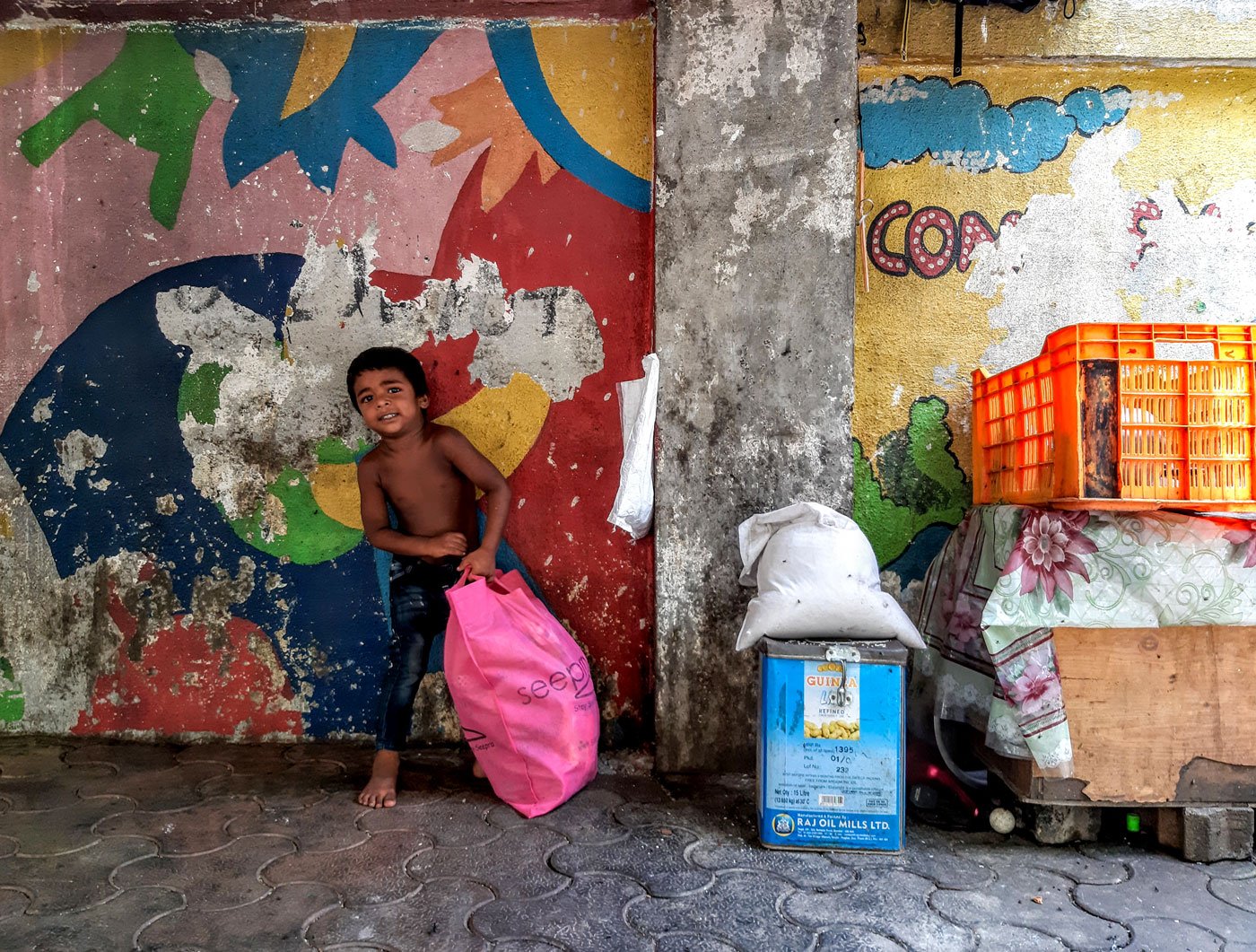
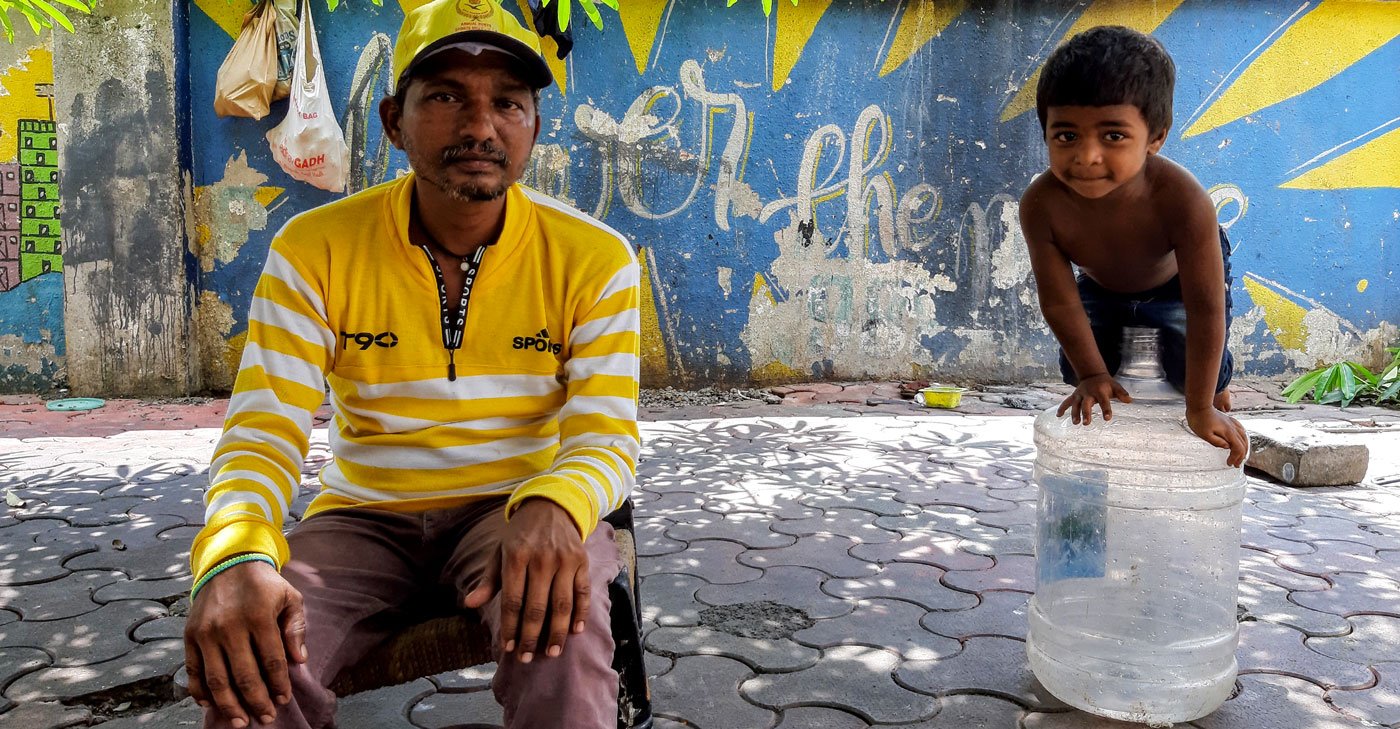
Siddharth – here, with his son Akshay – used to work at construction sites. 'That stopped when the lockdown began', he says
Meena’s children attend a Marathi medium municipal school in Samta Nagar in Kandivali East. Sangeeta, the oldest, is in Class 3, Ashant is in Class 2, Akshay is in the balwadi, and Shama is yet to start schooling. “At least the midday meal kept them going,” says Meena.
The school stopped holding classes on March 20. The kids have since been playing around, watching cartoons on Siddharth's phone when there is enough balance and the phone is charged (from a nearby shop).
Hearing the word ‘school’, Ashant walks over to where we are talking and demands an airplane. “I want to go to school on that,” he says. Sangeeta had been revising her lessons during the lockdown months – using books saved from the rain. She also spends her time doing housework -- washing utensils, taking care of her little siblings, fetching water, chopping vegetables.
She wants to become a doctor. “We cannot go to the doctors whenever we get ill, but when I become one we won’t have any problem,” she says. Getting to the municipal hospital in Kandivali West costs money, as does buying medicines, and Sangeeta has seen her mother lose two little children, twins, due to delays in getting medical help.
Meena herself studied till Class 3 in a municipal school in Damu Nagar in Kandivali East, where she lived in a slum colony with her mother, Shantabai. Her father left them when Meena was born; he didn’t want a girl child, she says. Her parents were from Bidar district in Karnataka. Meena does not know what work her father did, but her mother was a daily wage labourer, mainly cleaning drains for local contractors.
!['At least the midday meal kept them going [before the lockdown],' Meena says about her kids. Now the rains have further deleted their resources (right)](/media/images/05a-20200728_142413_1.max-1400x1120.jpg)
!['At least the midday meal kept them going [before the lockdown],' Meena says about her kids. Now the rains have further deleted their resources (right)](/media/images/05b-20200630_105423.max-1400x1120.jpg)
'At least the midday meal kept them going [before the lockdown],' Meena says about her kids.
Now the rains have further depleted their resources (right)
“My mother used to behave strangely, but also cared for me. She used to worry a lot, curse my father for leaving. By the time I was 10, it got worse,” recalls Meena. Her mother started talking to herself, screaming, stopped working. “People would say ‘Look at this mad woman’, and would suggest she be sent to a mental asylum.” Meena had to drop out of school to take care of her mother.
She found a job when she was 11 to babysit and stay with a family in Kandivali, for Rs. 600 a month. “I had to leave mother or else how could I feed both of us? I visited her every week.”
By the time Meena turned 12, her mother was gone. “I had not visited her for a week because of heavy rains. When I went, she wasn’t there. I asked people around, some said they took her away, but nobody knew who took her away.” Meena didn’t go to the police, she was afraid: “What if they sent me to an orphanage?”
She adds: “I hope she is alive and living in peace now…”
Meena continued the babysitting job for 8-9 years, staying with the family. But during vacations, when the family left town, she would stay on the streets for some time. And after she left the job, the street became her permanent home.
In Damu Nagar, she and her mother had faced regular harassment. “I was scared by the men’s dirty looks, they would try talking to me, especially the drunk ones. They used to say they want to help us, but I knew their intentions.”
!['I have never really slept [at night],' says Meena, who worries about her children's safety, especially her daughters Shama and Sangeeta (right)](/media/images/06-20200630_114007.max-1400x1120.jpg)
'I have never really slept [at night],' says Meena, who worries about her children's safety, especially her daughters Shama and Sangeeta (right)
Even now, Meena says she is constantly on alert. At times, Siddharth’s friends come by and the men have drinks together at her ‘house’. “I cannot stop them from drinking, but I have to be alert. I have never really slept [at night]. It’s not just for me, but also for my children, especially Sangeeta and Shama…”
Meena and her family are among Mumbai’s many homeless persons – at least 57,480 of them, says Census 2011. Over time, the government has devised schemes for the homeless in India. In September 2013, the Ministry of Housing and Urban Poverty Alleviation launched the National Urban Livelihoods Mission , which included a scheme for urban shelter homes, along with essential services such as electricity and water.
In 2016, the Supreme Court, responding to two petitions on the status of the homeless since the inception of such schemes, constituted a three-member committee headed by Justice (retired) Kailash Gambhir. The 2017 report pointed out how state governments were not using the funds allocated under NLUM. Maharashtra received nearly Rs. 100 crores that had remained unspent.
Dr. Sangita Hasnale, assistant municipal commissioner, Planning and Urban Poverty Eradication Cell, told me when we spoke on July 28, “We have approximately 22 shelter homes in Mumbai for the homeless and are planning for nine more. Some are under construction. Our aim is 40-45 shelter homes by next year.” (Dr. Hasnale also spoke about an now-Mahatma Gandhi Path Kranti Yojana, a scheme started in 2005, for people living in slums and the homeless. She said that families usually sold off the flats provided under the scheme and came back to live on the streets.)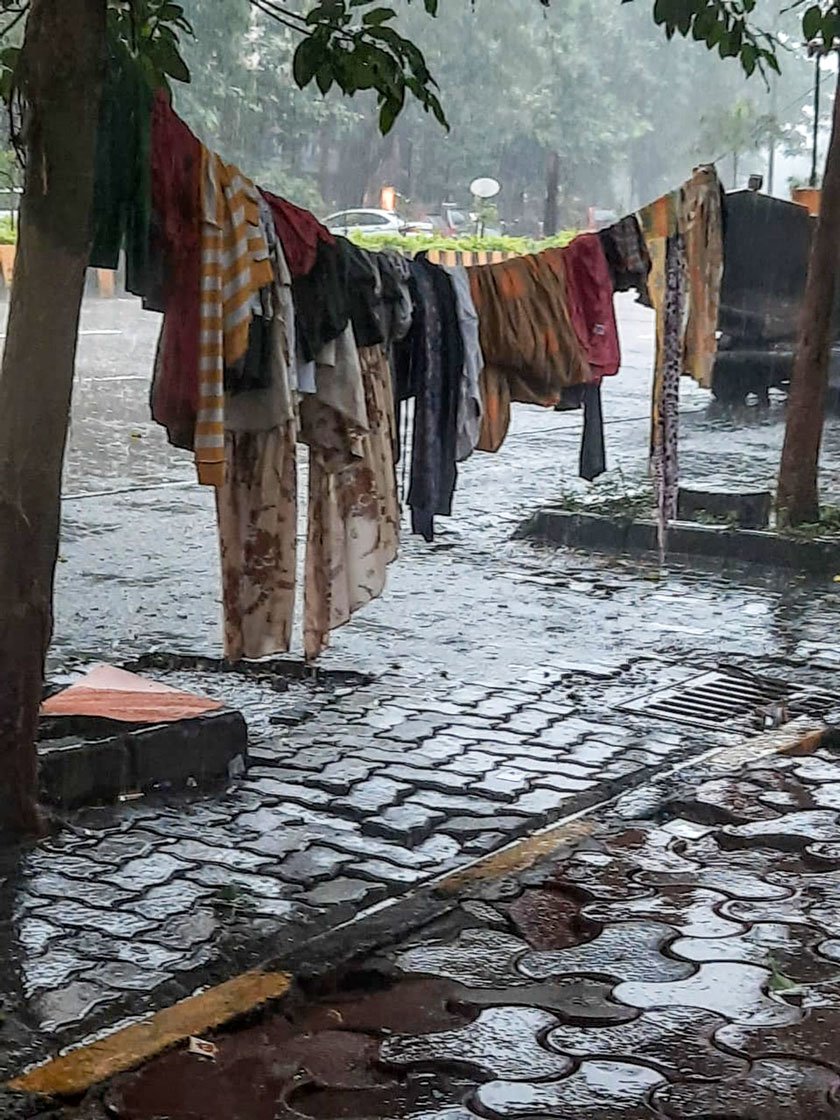
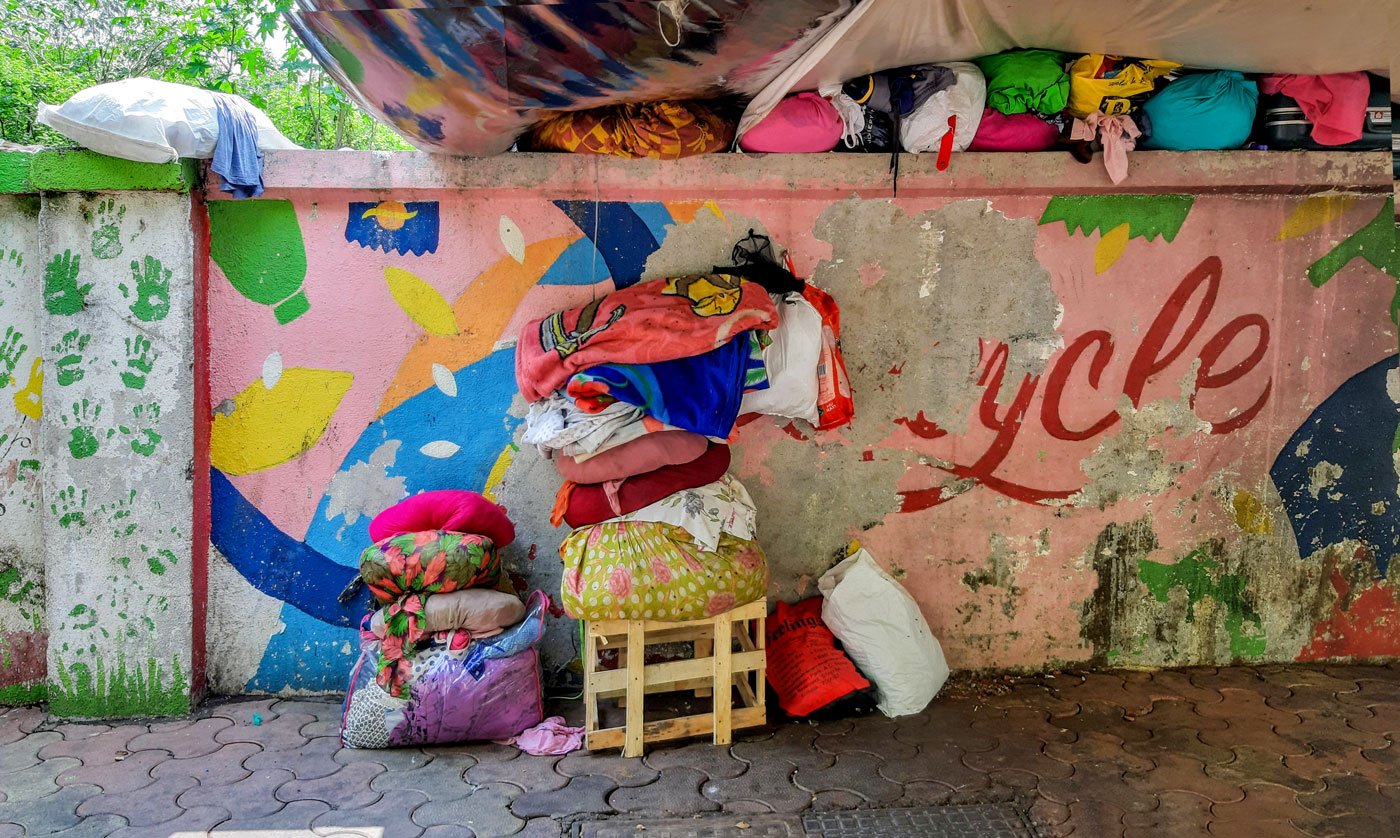
Meena and her family are used to seeing their sparse belongings float away every monsoon
However, says Brijesh Arya, convener of the Homeless Collective, “At present, Mumbai has only nine shelter homes, which is very low compared to the homeless population, and this number has remained the same for years.” Arya is also the founder of Pehchan, an NGO that works for the rights of the homeless.
Among the nine homes, none will take in entire families like Meena’s.
In early 2019, an NULM survey of the homeless in Mumbai showed their numbers had fallen to just 11,915. “The number of shelter homes didn’t increase but instead the numbers of homeless person has decreased? So where have they gone?” asks Arya.
In March 2004, a circular of the Maharashtra government also cited a Supreme Court order to assist the homeless in getting a ration card even if they don’t have IDs or address proof.
Meena doesn’t seem to be aware of any of these state benefits. She doesn’t have an Aadhaar card, ration card or bank account. “They ask us for ID and address proof; once a man asked me to pay him to make the identity card,” she says. Her husband has an Aadhaar card (based on his village address) but not a bank account.
Meena’s request is simpler: “Just get us two tapra [tarpaulin sheets] if you can to make my house stronger to withstand the rain.”
Instead, this month, she says, BMC staffers have come asking the family to leave the pavement. When this has happened in the past, they have packed up and simply moved to another pavement.
